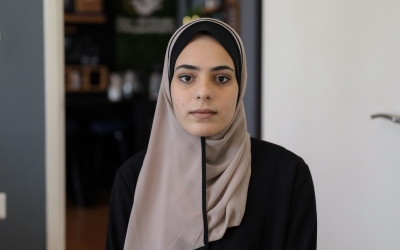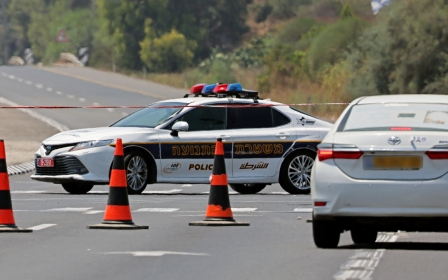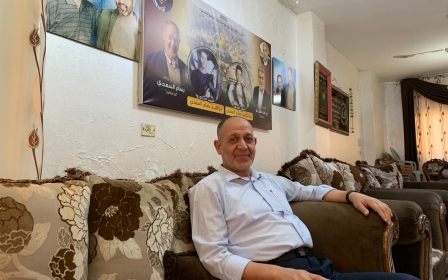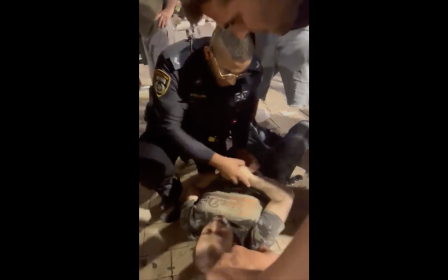Israel kills at least 10 Palestinians in fresh Gaza bombing campaign
The Israeli army has killed at least 10 Palestinians, including a five-year-old child and a senior military leader, in the latest bombardment on the Gaza Strip on Friday.
Follow our live coverage of the situation in Gaza here
Taiseer al-Jabari, head of the northern division of al-Quds Brigades (Saraya al-Quds), the military wing of the Islamic Jihad movement, was killed in air strikes that hit multiple locations in Gaza. At least 55 people were wounded, according to the Palestinian health ministry.
The initial attacks hit three different areas: Khan Younis in the south of the Strip, Shujaiya in the north, and a residential building in central Gaza.
New MEE newsletter: Jerusalem Dispatch
Sign up to get the latest insights and analysis on Israel-Palestine, alongside Turkey Unpacked and other MEE newsletters
The army said it was targeting the Islamic Jihad in the operation dubbed "Breaking Dawn".
Hamas, the de facto ruler in Gaza, and the Islamic Jihad, the second biggest armed group in the Strip, have promised a heavy response to the Israeli aggression.
Ziad al-Nakhalah, head of the Islamic Jihad, said there are no limits to this round of fighting and that Tel Aviv will be targeted.
"There are no red lines in this battle and Tel Aviv will fall under the rockets of resistance, as well as all Israeli cities," he said.
Gaza was hit by air strikes as well as artillery fire. The Islamic Jihad said it fired 100 rockets as an initial response late on Friday.
Fawzi Barhoum, the spokesperson for Hamas, said the resistance factions in Gaza are united and ready to respond with "full force".
Meanwhile, Israeli Prime Minister Yair Lapid said that the country will "not allow terrorist organisations in the Gaza Strip to set the agenda" and that the Israeli military will continue to act against the Islamic Jihad group "to eliminate the threat they pose to the citizens of Israel".
'A crime in every sense of the word'
Khalil Kanon lives on the 12th floor of Palestine Tower, a building in central Gaza that was hit on Friday during one of the first Israeli air strikes. He told MEE that the bombing left his wife and mother injured, his children in fear, and his entire family stained with blood.
"I was reading the news. Suddenly, we heard deafening bombardments. My mother's hand was injured, my wife's leg was injured, and my children were terrified," Kanon said.
'I had never thought this building could be bombed ... What is the life we have?'
- Khalil Kanon, Palestinian resident in Gaza
Following the bombing, Kanon's neighbour rushed to help and took his children and wife out of the building while Kanon awaited paramedics to assist in removing his mother from the building.
"All of us were stained with blood. Look, there is a blood stain on my t-shirt."
"I had never thought this building could be bombed ... What is the life we have?"
Ahmed al-Bata, a journalist, was waiting for the lift to go up to the 14th floor of the Palestine Tower - where his office is located - when the building was bombed.
"Suddenly, I heard three massive, intense bombardments," he told MEE.
"The scene was unbelievable. After some minutes, tens of residents started fleeing while shouting. Almost all of them were children and women. Tens of them were injured. The scene was so horrible. It's a crime in every sense of the word."
Arrest of Islamic Jihad leader
The attack comes after days of lockdowns imposed by Israeli authorities on residents living near Gaza, and troop deployments to the area. The measures included road closures and the halting of rail services near Gaza.
The Israeli army said these were in place due to the fear of retaliatory attacks by Islamic Jihad in Gaza after a senior leader of the group, Bassam al-Saadi, was arrested in the occupied West Bank city of Jenin.
The raid on the city also killed 17-year-old Palestinian, Dirar al-Kafrayni, who was shot dead by Israeli forces.
Saadi's son-in-law, Ashraf al-Jada, was also arrested in the raid. Saadi's wife sustained injuries during the arrest and was taken to hospital for treatment. Security camera footage of Saadi's arrest showed Israeli soldiers dragging the 62-year-old along the ground. He was also reported to have been injured by an Israeli army dog.
As news of the fatal raid spread, crowds gathered in Jenin refugee camp and the nearby city of Nablus, as supporters voiced solidarity with the highly respected figure. Islamic Jihad, seen as the second most influential Palestinian armed resistance group behind Hamas, said it has put its fighters everywhere on alert.
Ameer Makhoul, a leading Palestinian activist and writer, told MEE: "No one should have been surprised by the Israeli aggression on Gaza and targeting the leaders of the al-Quds Brigades and the civilians."
Makhoul added that the military build-up on and around the border of Gaza was "not a defensive behaviour" or in anticipation of the Islamic Jihad's response to Saadi's arrest.
"Rather, the arrest came as part of the preparation for a new aggression with goals, strategy, even if it is limited in scope," he said.
Meron Rapoport, a veteran Israeli analyst, said that the timing of the Israeli operation was strange and that Israel was essentially punishing the Islamic Jihad group for not attacking in retaliation to Saadi's arrest, given that the group only launched rockets after Israel launched air strikes on Gaza.
"Israel arrests a senior member of Islamic Jihad in the West Bank, the group does not respond," Rapoport continued, referring to the arrest of Bassam al-Saadi earlier this week in Jenin.
But then, "Israel puts tens of thousands of residents in the areas adjacent to Gaza under curfew on the grounds that Islamic Jihad is planning a response, then kills senior members of the group in Gaza, as well as civilians, on the grounds that they planned to attack Israel."
"The bottom line is, after Israel allegedly tried to prevent Islamic Jihad attacks, it is now receiving rockets that apparently would not have happened if Israel did not attack first."
US defends Israel, UN urges de-escalation
In response to Israel's bombing of Gaza, the United States said that the country has the "right to defend itself".
The attacks come just weeks after US President Joe Biden visited Israel. Ahead of his trip, his administration had reportedly asked Israel to hold off on any escalations against Palestinians "until after Biden's visit" in mid-July.
The request was condemned by Palestinian activists, who told MEE that it was "illustrative of the United States' real policy toward Israel", in that the US does not care how Israel treats the Palestinians.
'After Israel allegedly tried to prevent Islamic Jihad attacks, it is now receiving rockets that apparently would not have happened if Israel did not attack first'
- Meron Rapoport, Israeli analyst
Meanwhile, the UN issued a sterner statement, saying that there is "no justification" for attacks against civilians.
"I am deeply concerned by the ongoing escalation between Palestinian militants and Israel, including the targeted killing today of a Palestinian Islamic Jihad leader inside Gaza," Tor Wennesland, the UN's special coordinator for the Middle East peace process, said in a statement on Friday afternoon.
"The continuing escalation is very dangerous," Wennesland said.
Israel has maintained a crippling blockade on the Gaza Strip since 2007, which rights groups say amounts to collective punishment of the enclave's two million residents. Israel prevents the importing of materials and equipment into Gaza and has imposed tight restrictions on exports, leading to a state of "paralysis" in several sectors of Gaza's economy.
Egypt also upholds the siege, controlling movement in and out of Gaza on its border.
An Israeli military assault on Gaza in May last year killed more than 260 Palestinians, including 66 children, and displaced at least 72,000 people, according to the Gaza health ministry.
Human Rights Watch said in a report that the 2021 Israeli air strikes had targeted areas where there were no evident military targets in the vicinity, which amounted to war crimes.
Middle East Eye delivers independent and unrivalled coverage and analysis of the Middle East, North Africa and beyond. To learn more about republishing this content and the associated fees, please fill out this form. More about MEE can be found here.





